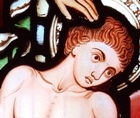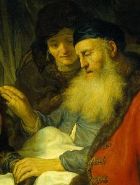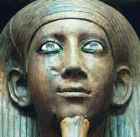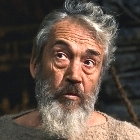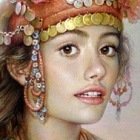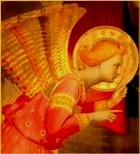Jacob – Bible patriarch
 Jacob, son of Isaac and Rebecca, twin brother of Esau, husband of the sisters Rachel and Leah, and father of the twelve sons who became the ancestors of the twelve tribes of Israel
Jacob, son of Isaac and Rebecca, twin brother of Esau, husband of the sisters Rachel and Leah, and father of the twelve sons who became the ancestors of the twelve tribes of Israel- Rachel, his beloved wife, mother of Joseph & Benjamin, died giving birth to Benjamin
- Leah her older sister, also married to Jacob. The ‘unloved’ wife who all the same bore her husband six sons and a daughter.
- Joseph, favored son of Jacob
- Labin, father of Rachel and Leah
The birth of Esau and Jacob
Rebecca, wife of Isaac, bore twin sons, Esau and Jacob. When they were born they seemed to be scrambling for first place: Esau came first, but Jacob came out holding onto Esau’s tiny heel. They were in competition from the start.
But they were quite different in personality. Jacob was a thinker, a man who preferred to stay close to home. Esau was a man’s man, a hunter and farmer.
As the old saying goes, one was ‘arty’, the other was ‘hearty’.
Theft of the Birthright and Blessing
Jacob hated being second in line. He always wanted the birthright – the eldest son was entitled to twice the inheritance that any of his brothers got when their father died.
One day when Esau came in from the fields, famished with hunger and exhausted, Jacob refused to give him the food he was cooking unless Esau renounced the birthright of the eldest son and gave it to him.
Esau probably didn’t take him too seriously, and when Jacob insisted he gave in, to get his hands on the food. He swore an oath that Jacob would have the birthright of the eldest son.
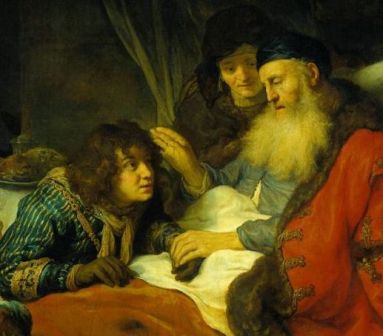
Isaac Blessing Jacob, Govert Flinck
Their father Isaac loved Esau better than Jacob, but Jacob was his mother’s favorite. She decided that he, not Esau, would be a better leader of the tribe, and she primed Jacob on how to steal the Blessing from Esau – the Blessing of the tribal leader had ritual and legal significance, naming the next leader of the tribe.
Rebecca waited until Isaac’s eyesight was failing badly, then she disguised Jacob so that Isaac mistook him for Esau.
Jacob was a willing partner to the trickery, disguising his voice, skin and clothing so that Isaac would think he was speaking to Esau. The old man then gave the Blessing not to the son he favored, but to Jacob.
Jacob’s dream
Knowing that Esau would be enraged by what he had done, Jacob fled. He took his mother’s advice and set off for Padan-Aram, where her family still lived. On the journey he stopped one night and lay down to sleep, laying his head on a flat stone.
While he was asleep he had a strange dream that affected him deeply. He dreamed he saw a ladder reaching from the earth up to heaven, and angels were going up and down the ladder. Then God stood beside him and spoke, telling Jacob that this land should be his, and that he would have innumerable descendants.

A stone altar on the slopes of Bethal
Then Jacob woke up, and was afraid. God was in this place, and Jacob had somehow stumbled on a place that joined heaven and earth.
Next morning he took the stone he had used as a pillow and set it up as an altar, pouring oil on it to sanctify it.
He called the place Bethel.
Jacob marries two sisters
Then he set out again on his journey to his mother’s family. He came to a well where some shepherds were watering their flocks. A young girl wanted to draw water from the well, and Jacob learnt from the shepherds she was Rachel, a cousin of his, daughter of his mother’s brother Laban.
Jacob was smitten. He rolled the stone away from the lid of the well for her and she took him to meet his relatives.
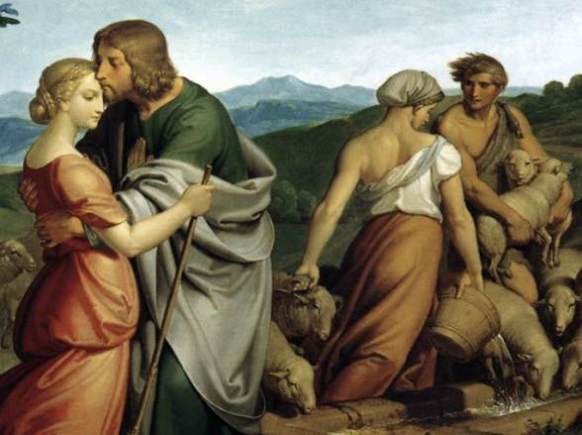
The meeting of Jacob & Rachel, Leah in the background. Joseph Fuhrich
But Laban had not one, but two daughters, Leah and Rachel. Jacob wanted to marry Rachel, and said so. But he had no bride price, and Laban demanded that Jacob work for him for seven years to pay the bride price for Rachel.
This Jacob did, and at the end of the seven years he prepared to marry Rachel.
Jacob the trickster is tricked
But Laban tricked him into marrying Leah instead – the face of the bride was hidden during the wedding, and once they’d had sexual intercourse in the darkness of the wedding night, there was no going back.
Of course when Jacob found out he’d been tricked he was white-hot with anger. He had tricked his father Isaac but now had been tricked in turn by his uncle. He demanded to be given Rachel, and was so threatening that Laban agreed – on condition that Jacob work another seven years for her.
This he did – but the anger inside him rankled, and he planned a way to get even.

This paintings by Michelangelo in the Sistine Chapel is labelled ‘Jacob, Joseph’. On the left side sits Jacob – and the face given him by Michelangelo suits the deceitful man in Genesis very well. Beside him is a rather sickly Rachel (she dies at the birth of her second son) with her first son Joseph. On the right side is Leah ‘of the beautiful eyes’, blessed with many sons and a daughter Dinah (far right), whose life will be ruined when she is raped by a man who professes to love her.
Be wary of information on art websites that tells you the ‘Joseph’ referred to in this painting is Joseph, husband of Mary of Nazareth, and that the female figure on the right is Mary of Nazareth. Comments like this are made by art historians who do not seem to have read the Old Testament stories on which Michelangelo based his Lunettes.
Jacob outwits Laban
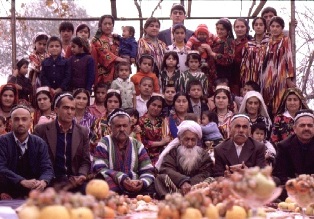 Jacob now had four wives – two full wives in Leah and Rachel, and their two maids Zilpah and Bilhah. He loved Rachel, but she did not seem able to conceive.
Jacob now had four wives – two full wives in Leah and Rachel, and their two maids Zilpah and Bilhah. He loved Rachel, but she did not seem able to conceive.
Leah on the other hand was fertile. She had six sons and a daughter, Dinah, in rapid succession.
Zilpah had two sons, as did Bilhah.
Finally Rachel had a son whom she called Joseph.
Meanwhile, Jacob and Laban had worked uneasily together. Neither trusted the other, with good reason. When the full bride price had been paid, Jacob asked Laban if he could leave and return to his native country.
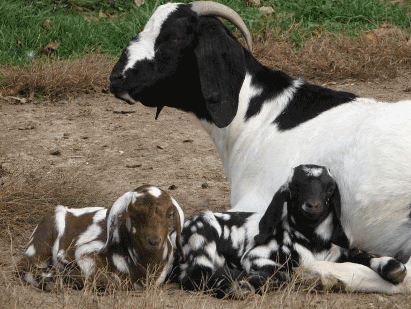 Laban prevaricated, but they came to an arrangement. Laban’s flocks would consist of all the animals who were white. Jacob could have all the animals who were spotted or dark – these were not as valuable as the white animals. Laban thought he had made a bargain, but Jacob took steps to stop the white animals breeding, and put the strong male animals with the spotted or black females, so that he bred a stronger and more numerous flock.
Laban prevaricated, but they came to an arrangement. Laban’s flocks would consist of all the animals who were white. Jacob could have all the animals who were spotted or dark – these were not as valuable as the white animals. Laban thought he had made a bargain, but Jacob took steps to stop the white animals breeding, and put the strong male animals with the spotted or black females, so that he bred a stronger and more numerous flock.
He had outwitted Laban.
Figurines from Ur, southern Mesopotamia, 5,000-4,000BC
Jacob escapes from Laban
One day, without any farewell, Jacob gathered up his wives, children and flocks, and left.
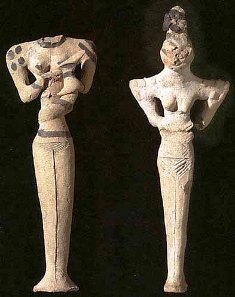
Figurines from Ur, southern Mesopotamia, 5,000-4,000BC
Rachel, who had never forgiven her father for tricking Jacob into marrying Leah, stole the household gods – small statuettes that represented the spirit of her family, similar to the lares and penetes of the Romans. This might seem a petty action, but these statuettes guaranteed legal title to all Jacob had taken from Laban.
Jacob did not know she had done this, but had he known he would probably have approved.
When Laban found out, he pursued them – to get back his flocks and the statuettes. When they met each one accused the other of cheating – and each one was right.
But they agreed to a truce, with each one staying on his own side of an agreed landmark.
Laban looked for the statuettes, knowing they must be in Jacob’s camp, but Rachel hid them in a saddlebag then sat on them. She had her menstrual periods, she told her father – and by tribal law this meant he would be unclean if he touched the place where she had been sitting. He could not search the saddlebags, and so she had her revenge on her father.
Jacob wrestles with the Angel
Jacob moved on.
As he approached his home territory, he knew there would be a confrontation with Esau, his wronged brother. He heard that Esau had set out looking for him, and was afraid. Cautiously
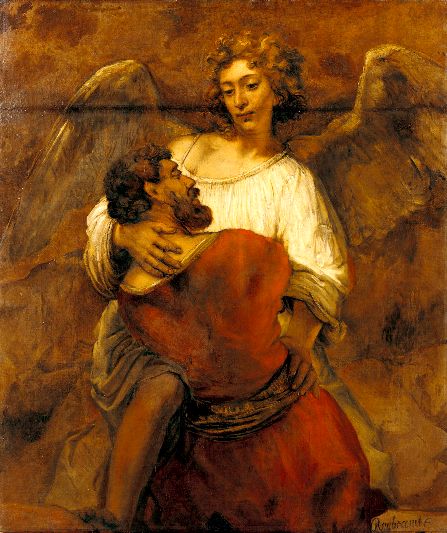
Jacob wrestling with an Angel, Rembrandt. See What Are Angels?
he sent flocks of animals as a sweetener to appease Esau, then waited to see what would happen. He also sent his wives and children away, so that they would be safe.
That night, standing alone by the River Jabbok, a solitary man approached Jacob and began to wrestle with him. They wrestled and fought all night, but neither could get the upper hand.
Then the stranger struck Jacob in the hollow of his thigh, and Jacob’s hip was dislocated. But Jacob held on. The stranger told him to let go, but Jacob demanded a blessing before he would do so.
‘What is your name?’ asked the stranger. ‘Jacob’. ‘Now it is no longer Jacob, but Israel’, said the stranger.
Jacob knew that he had seen God face to face – and lived.
But Esau was still coming, and Jacob had to deal with that. He prepared for the worst, but to his amazement Esau ran to meet him, embracing him and welcoming him. He held no grudges – in fact, throughout the story he is consistently more likable than Jacob. They wept together, and were reunited as brothers, Esau having forgiven his brother completely.
The rape of Jacob’s daughter Dinah
Jacob continued on to the city of Shechem, where he bought land. His family began the process of settling there, and the women began to visit the local women and make friends with them.
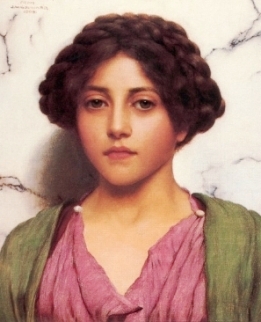 On one of these visits Jacob’s daughter Dinah was molested by the son of the local ruler, Shechem son of Hamor.
On one of these visits Jacob’s daughter Dinah was molested by the son of the local ruler, Shechem son of Hamor.
Molested is too gentle a word. The young girl was raped.
Strangely, Shechem seems to have fallen deeply in love with her at the time – the Bible says ‘his soul was drawn to her’. He persuaded his father Hamor to ask for her hand in marriage.
Nowhere in this story is Dinah’s reaction described.
Jacob knew what had happened, but his sons did not – they were away in the fields at the time.
When they heard about it they were very angry, but Hamor met with them and told them his son wanted to marry Dinah, and that this could be the beginning of friendship between the inhabitants of the city and the new settlers. There could be intermarriage, trade and friendship between the groups.
But Jacob’s sons held onto their anger, and made a condition: that Shechem could only be accepted by them if he was circumcised. Not only Shechem, but every male among Shechem’s people.
Probably to their surprise, Shechem was more than willing to fall in with their request. There is something rather plaintive in his desire to please Dinah’s brothers. He seems truly to have loved Dinah. He persuaded all the men of the city to accept the newcomers as equals, and to be circumcised. He himself led the way.
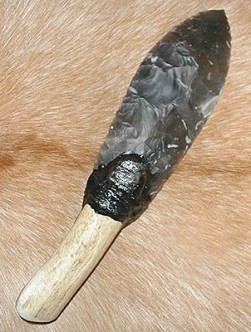 But a few days later, when all the men of the city had been newly circumcised and were in pain with the wound, the sons of Jacob attacked them and the city, killing and looting, stealing the wives and children of the city and taking all the loot they could.
But a few days later, when all the men of the city had been newly circumcised and were in pain with the wound, the sons of Jacob attacked them and the city, killing and looting, stealing the wives and children of the city and taking all the loot they could.
They killed Hamor and Shechem and took Dinah out of Shechem’s house where she had gone to live.
Jacob was aghast. He himself has been a trickster, but not a murderer. Now the tribe was in real trouble, with a whole new set of enemies. His sons’ grisly acts had destroyed the harmony that might have been.
Hastily Jacob pulled up roots and fled, taking his family and all they could carry to Bethel where they would be safe.
Jacob’s sons sell their brother Joseph
After they had been in Bethal awhile they set out again, but Rachel was heavily pregnant, and not strong. She had a difficult labor, gave birth to a son called Benjamin, then died.
Jacob had lost the woman he loved more than any other.
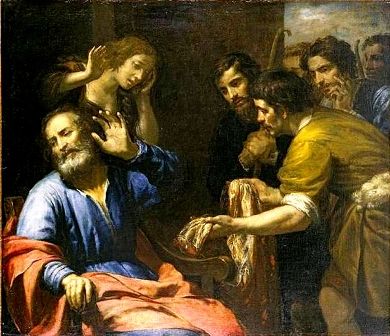
Joseph’s Coat Brought to Jacob, Giovanni Andrea de Ferrari
Her son lived on – Joseph, and Jacob loved him more than any of his other sons.
He favored Joseph in many ways – there is a hint of this in the mention of the long-sleeved coat Jacob gave to Joseph. Heavy work cannot be done in a long-sleeved coat, so the fact that Joseph gave him this article of clothing meant that Joseph was not expected to do any of the heavy, tedious work of a tribesman or farmer.
Unfortunately Joseph’s sons were well aware of this, and grew jealous of Joseph. One day when they were away from Jacob and the rest of the tribe, Joseph’s brothers saw a chance to kill him – to get rid of him permanently.
Only one of them spoke out against the plan – Reuben, the eldest son of Leah. He suggested that instead of killing him they imprison Joseph in one of the empty water cisterns – he meant to come back later and free his brother. Eventually they ended up selling Joseph as a slave to a passing trader.
Jacob was heartbroken when they went back and told their father that Joseph had been killed by a wild animal.
Only many years later did he find out the truth, when he and his sons went to Egypt and met Joseph, not dead at all but doing very well indeed for himself.
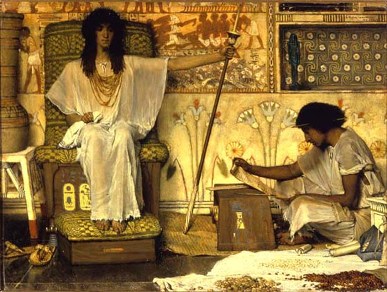
Joseph, Overseer of Pharaoh’s Graneries, Alma Tadema
Jacob died happy, knowing that his son Joseph was successful and respected.
His final request was that Joseph return him to his homeland, to be buried with his ancestors, and Joseph honoured this final request.
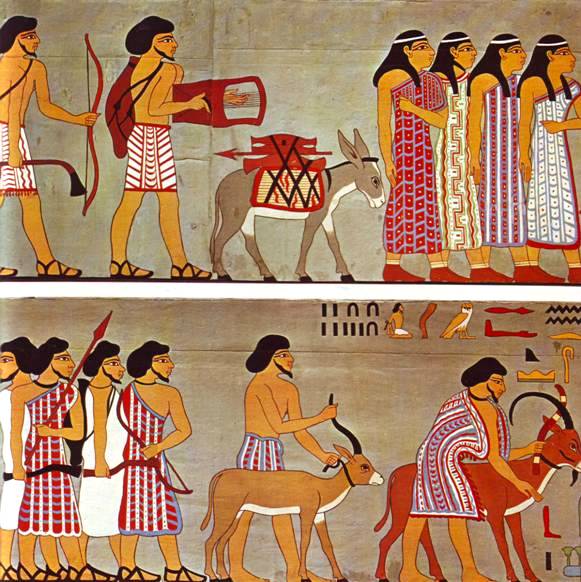
An Egyptian tomb fresco showing nomadic Semitic traders (like Jacob’s family) travelling to Egypt
Search Box
![]()
© Copyright 2006
Elizabeth Fletcher

